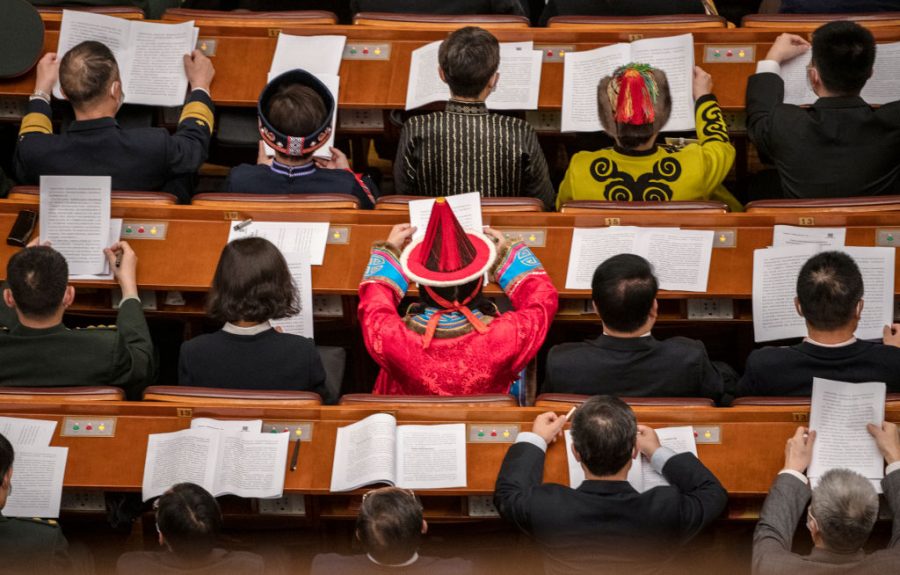
This month in Beijing, the so-called two sessions of the National People’s Congress and the Chinese People’s Political Consultative Conference convened to formalise a range of policy goals for China’s economic development, environmental management, law, foreign affairs and more. This year, there’s been the promulgation of the 14th five-year plan (2021–2025) and the continuing dismantling of Hong Kong’s governance system.
The two sessions are a highly formalised performance that express the machinery of power in the People’s Republic of China. They are only the public moment of an extremely dense and complex policy formulation process that happens behind closed doors in the months and even years before delegates meet.
Taiwan is always mentioned in key speeches at these meetings.
Premier Li Keqiang offered two paragraphs in his work report to the NPC in which he reasserted Beijing’s commitment to its ‘one China’ principle and the
1992 Consensus. He also warned against separatist activity while promoting engagement: ‘We will promote exchanges, cooperation and integrated development across the Taiwan Strait. Together, we can shape a bright future of rejuvenation for our great nation.’
Similar references to Taiwan were made in the
CPPCC work report by chair Wang Yang and, with more specifics, in a section of the five-year plan devoted to Taiwan.
The references were mostly standard for PRC statements on Taiwan over recent years: the 1992 Consensus, the ‘one China’ principle, condemnation of ‘separatists’ and warnings about the use of force, as well as promotion of investments links and people-to-people exchanges.
In 2021, these statements come in the context of a significant rise in Beijing’s pressure on Taiwan since the re-election in a landslide of President Tsai Ing-wen. Most worrying has been military overflights in the Taiwan Strait that have tested Taiwanese military reactions and sought to normalise the presence of the People’s Liberation Army Air Force.
That the two sessions offered established positions on Taiwan says that Beijing hasn’t made fundamental changes to its Taiwan policy but for now is still working within the existing framework. By way of comparison, the NPC has in the past signalled sharp changes in Taiwan policy. In 1979, it issued the
Message to compatriots in Taiwan formally ending the ‘liberate Taiwan’ policy set in 1954 in response to the end of the Korean War and the signing of the Sino-American Mutual Defense Treaty, and which formally drew a line under the anti-Japanese Second United Front between the Chinese Communist Party and the Kuomintang from 1936 that collapsed in the early 1940s.
That there are no comparable changes this year places the recent military activity as a tactical move within the existing framework rather than as part of a fundamental strategic shift or CCP ideological reassessment.
This doesn’t offset the likelihood of a crisis, however. Within the core positions, there were pointers on the ideological structure of PRC Taiwan policy that suggested vectors of escalation.
It was notable that Li didn’t include a reference to ‘one country, two systems’ as Beijing’s formula for Taiwan’s future, especially since the 2019 speech President Xi Jinping gave for the 40th anniversary of the
Message to compatriots in Taiwan made much of ‘one country, two systems’. Clearly, events in Hong Kong and Beijing’s response to them,
including at this year’s NPC, call into question the meaning and use of the term, but Li did still apply it to Hong Kong, so it might be premature to say that it has been formally abandoned.
PLA spokesman Wu Qian
made a statement about Taiwan that noted the activities of a ‘tiny number of separatists’ and warned Taipei not to try to ‘borrow strength from foreign forces’. These phrases are not unprecedented, but they could be used as a pretext for military action against Taiwan if Beijing were to claim that such activities had become an existential threat to ‘reunification’ and therefore to the task of the ‘great rejuvenation of the Chinese nation’.
There were other potentially interesting comments during the two sessions. The
Global Times, while not always a reliable source,
reported that CPPCC members had floated the need for new legislation promoting unification. At the same time, Transport Minister
Li Xiaopeng released a plan for 2035 that included an undersea rail link between Taiwan and Fujian province, an implausible proposal first suggested in the mid-1990s that highlights the challenge in separating out substantive policy changes from political theatre in the PRC system.
What the two sessions have not signalled is any tone of compromise within the existing framework. Beijing remains unwilling to reach out to Taiwan’s elected government under Tsai and has not matched claims of ‘exchanges, cooperation and integrated development’ with
reduced military activity in the Taiwan Strait.
The ideological and policy framework put in place in 1979 has failed to realise Beijing’s goals for more than 40 years, and this has created structural tension in the PRC’s Taiwan policy architecture. The lack of compromise is symptomatic of a system with limited mechanisms for thoroughgoing policy reassessments and an ideological belief that policy failure is a reflection only of a lack of commitment, not of a policy being in any way wrong.
US and other naval forces have undertaken transits through the Taiwan Strait and members of US President Joe Biden’s administration have made comments in support of the status quo. In the absence of any signs of softening from Beijing or an abrupt change in PRC Taiwan policy and ideology, maintaining these calibrated international actions to ensure they figure in Beijing’s Taiwan policy calculus remain the best guarantor of regional security.
 Print This Post
Print This Post